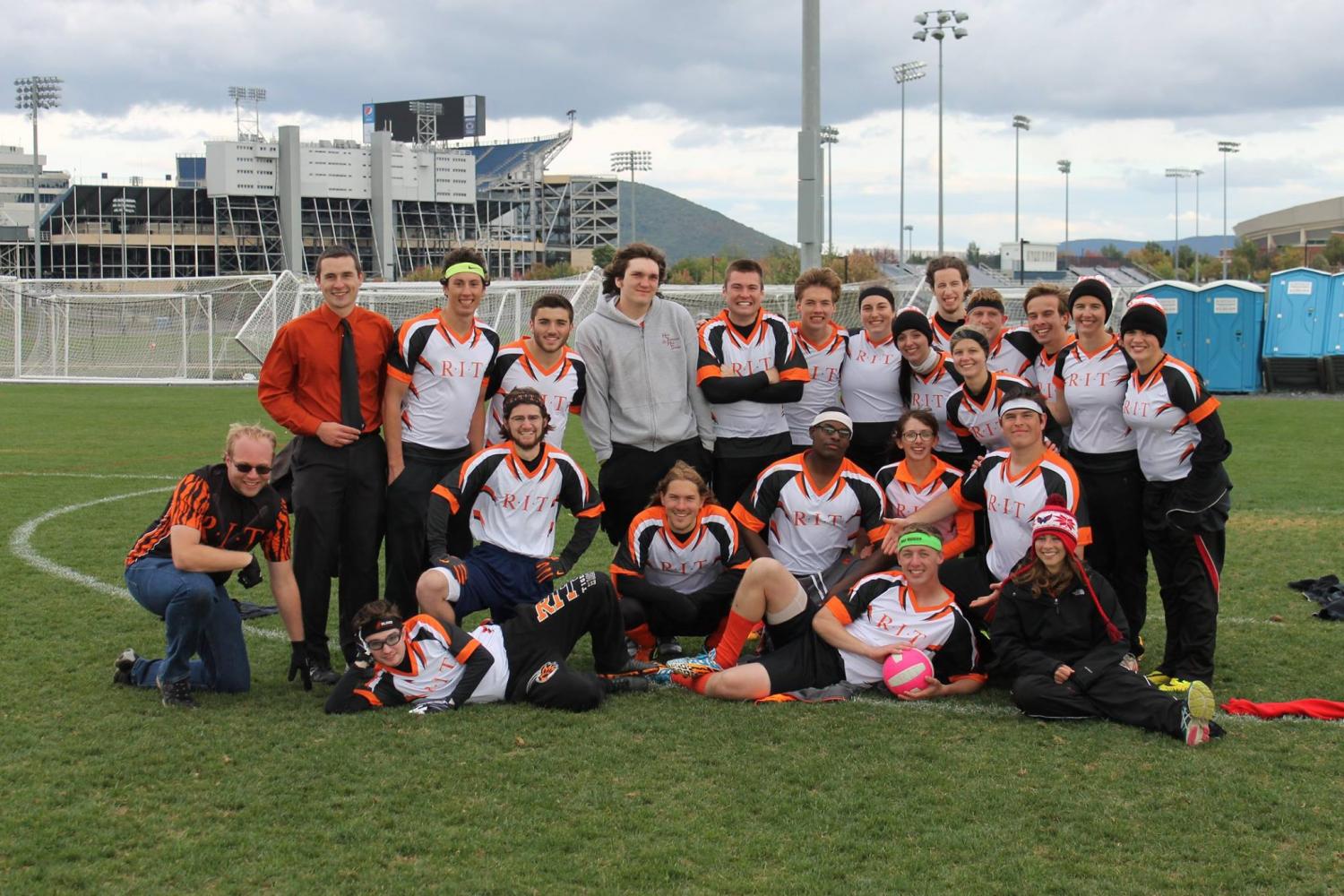If you ever see a group of 14 or so people gathered around the grounds near Gracie's shouting Harry Potter-isms such as "Get that Snitch!" and "Bludger alert!" there are a few things you should be sure to do. First and foremost, get out of harm's way, as you might be in the line of fire of a few dodgeballs. Second, don't panic–RIT has a Quidditch team, and they're actually kind of a big deal.
For the people who are furrowing their brows right now, hang tight and take a peek into the craziness that is the Harry Potter fandom. This was supposed to be a fictional sport that author J. K. Rowling made up for use in the story, but some intuitive person somewhere managed to find a way to play in real life. Now college campuses across the country have their own Quidditch teams, and RIT is no exception.
According to the club’s website, the RIT Quidditch Team, the Dark Marks—a name they are beginning to transition away from—began in the fall of 2009, and after receiving official status in the fall of 2010, has grown in leaps and bounds. Today, RIT’s Quidditch team is an official member of the International Quidditch Association (IQA) and a regular participant in the Quidditch World Cup.
There are four kinds of players on each team: three Chasers, whose job it is to score points by putting the Quaffle (a volleyball) through the opponent’s hoops; two Beaters, who try to take people out of the game by hitting them with a Bludger (in this case, a dodgeball); a Keeper, who acts as a goalie; and a Seeker, who is the only one who can end the game by catching the elusive Snitch.
“At the beginning, there were only seven people in the club, so yeah, we’ve come a long way,” Captain Kenneth Radzyminski said with a chuckle.
For those of you who are still wondering exactly how Quidditch is played in our pitifully magic-lacking reality, Radzyminski explained:
“A goal is still worth 10 points, but instead of the Snitch being 150, it has been brought down to 30,” Radzyminski said. “Also, because this is a co-ed game, we have a rule that says there must be two people from each gender on the field at any point of time.”
The team has achieved a great deal in its four years of existence. Back in 2011, it was the Division Two runner-up in Randall’s Island, New York City. Then, at the Quidditch World Cup 2012-13 in Florida, the team placed 27th in the world.
“[The] next year, we played at Myrtle Beach, which was pretty cool,” Radzyminski said. “This time, we bettered ourselves and climbed six places to 21st in the world and also third in our region.”
It seems as if most RIT students are unaware that the 21st-best Quidditch team in the entire world has been right under their noses for years at this point, but there are still plenty of opportunities to watch them play.
“As a matter of fact, our season began on the 20th of September,” Radzyminski said. “We played SUNY Geneseo, Ithaca College, University of Rochester and Rensselaer Polytechnic Institute and won against all of them by comfortable margins.”
As they begin to get a bit more serious and competitive, rumors have emerged that people are being turned away from the club.
“Yes, we have turned people away, but not from the club. Only from the team,” Radzyminski said. “We had tryouts at the beginning of the semester and picked the people who we thought would add to the team. Anyone and everyone who wants to play Quidditch is welcome to join the club and attend practices.”
With a terrific beginning of the season under their belts already, The Dark Marks' goals for the future seem well within their grasp.
“This season is basically going to be about improvement,” Radzyminski said. “Improving our world rank, improving our tactics and our game in general.”
For the next tournament, the team will travel to Boston for an eight-team tournament where it will face the Boston University team, which is ranked fourth in the world. The Dark Marks will also compete in the regional tournament, held right here in Rochester, on Nov. 15 and 16.
“I went to the Club Fair the Sunday before classes start, played a few pickup games with them, and have never really looked back,” said Samuel Bankowski, the longest serving member of the club, who appeared visibly delighted to be talking about the club. “To kind of put it into perspective, we only had one day a week when we met in the fall of 2010, played a few pickup games and we struggled to have maybe like 15 people at most, whereas now we have practice four days a week and there [are] usually 30 people at practice sessions.”
Bankowski recounted the toughest game of Quidditch he has played in his career so far.
“It was regionals down in Rhode Island, two years ago,” Bankowski said. “We were playing a team from Boston. It lasted about 40 to 45 minutes, if you count the injury delay. One of our players accidentally collided with the Snitch, and we had a substitute Snitch come on. That was a five to eight minute break.”
“One of our Chasers is out 'til January with concussion symptoms, and another one of our Chasers, she got a concussion couple of weeks ago but she should be back in a week or so,” Bankowski continuedhe said. “A lot of people are banged up from Penn State the past weekend. To put into perspective the extent of injuries, only a handful of people played all three games while we were there.”
With mounting membership, highly competitive seasons and a sense of camaraderie and teamwork that rivals the most highly-watched sports, this is a sport—and a team—not worth missing out on.








